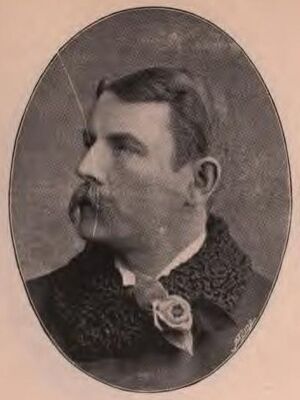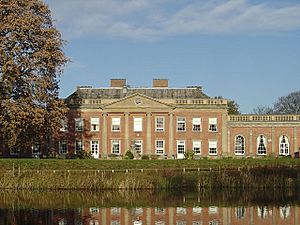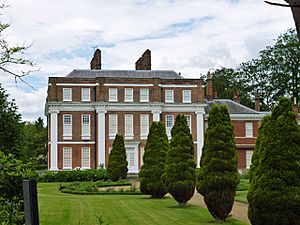Horatio Davies facts for kids
Sir Horatio David Davies (1842–18 September 1912) was an important London businessman, politician, and judge. He was also a key person in making Pimm's a famous drink around the world.
Contents
Early Life and Education
Horatio David Davies was born in 1842. As a boy, he was a "poor scholar" at Edward Alleyn's school, which was known as 'Dulwich College'. This school was founded in 1619. The old buildings where he studied are now called The Old College and Almshouses.
When Horatio was about 15, the school changed its name to Alleyn's College of God's Gift. It was split into two parts. He later said that as a young boy, he saw the bones of the school's founder, Edward Alleyn, when his tomb was moved.
After finishing school, Horatio trained for seven years to be an engraver. However, he decided this job wasn't big enough for his dreams and energy.
Later in life, he became involved in both business and politics. He was known for being loyal to his old friends in his projects. He also served as an officer in the 3rd Middlesex Artillery Volunteers for many years, leaving with the rank of honorary Lieutenant Colonel.
Business Ventures
Starting Restaurants
In the early 1870s, Horatio Davies teamed up with his wife's brother, Frederick Gordon. They opened restaurants for business people. Their first successes included the 'London Tavern' and 'Pimm's Oyster Bar'. They also opened the 'Holborn Restaurant' and Crosby Hall in Bishopsgate.
Crosby Hall was a very old building, dating back to 1466. It was once a palace for King Richard III. It's one of the oldest buildings in the City of London. Frederick Gordon & Co. turned it into a restaurant in 1868. Horatio later sold Crosby Hall in 1907. The building was taken apart in 1910 and rebuilt in Cheyne Walk, Chelsea.
Horatio also owned another restaurant called the 'Ship and Turtle' in Leadenhall Street.
Making Pimm's Famous
James Pimm created the Pimms drink to help people digest the oysters he sold at his shop in Poultry, London. In 1880, Horatio Davies bought the Pimm's business.
He then started a chain of Pimm's Oyster Houses in 1887. Horatio also began bottling the famous 'Number One Cup' drink so other places could sell it. He expanded the Pimm's restaurants to five locations. Slowly, he built up a business that sold Pimm's to other countries. By the time he passed away in 1912, Pimm's cocktail was known all over the world, especially in the British Empire.
Public Service and Politics
Horatio Davies was very active in law and politics, both locally and nationally. He was an Alderman in London. He first joined the Court of Common Council in 1885, representing the Ward of Cheap. Four years later, he became an Alderman for Bishopsgate.
In 1887, he was chosen to be Sheriff of London and Middlesex. His name is on a plaque that celebrates the opening of Tower Bridge in 1894.
He was also the head of two important London trade groups: the Worshipful Company of Loriners and the Worshipful Company of Spectacle Makers. In 1897, he became the Lord Mayor of London. His old school's military group, the Dulwich College Rifle Volunteer Corps, even took part in his Lord Mayor's Show parade that year. People said he hosted more fancy parties than any other Lord Mayor.
In 1897, Queen Victoria celebrated her Golden Jubilee. Horatio welcomed the Queen to the City of London as part of the celebrations. At the end of his time as Lord Mayor, he was made a knight.
Member of Parliament
Horatio first tried to become a Member of Parliament (MP) for Rochester in 1889, but he didn't win.
He tried again in the July 1892 election for Rochester and won, becoming an MP. However, there were questions about how the election was run. A court decided the election wasn't fair, and he lost his seat in December that year. A new election was held in 1893.
Horatio Davies then held a seat for Chatham from 1895 to 1906 as a member of the Conservative Party. He won without anyone running against him in the 1900 election. But he lost his seat in the 1906 election.
Later Life and Legacy
In 1898, Horatio Davies also became a judge for Kent and one of the Queen's Lieutenants for London. As a judge, he was seen as fair but strict with those who did wrong. He was also kind to people who were in trouble. He was given a special award from France called the Officer of the Legion of Honour. He was made a Knight Commander of the Order of St Michael and St George (KCMG) in 1898.
He traveled a lot. He had just come back from a trip to South Africa before he passed away on 18 September 1912. He died at Watcombe Hall in Torquay, Devon.
Personal Life
In 1867, Horatio married Lizzie, who was the sister of his business partner, Frederick Gordon. After Lizzie passed away in 1907, he married Pauline Marie Boniface in 1909.
In 1888, he bought Colwick Hall in Nottinghamshire. He owned it for a short time before selling it to a group that created a horse racing track there.
In 1890, he bought Wateringbury Place in Kent. He loved art and bought many famous paintings to fill his home. One of these was a painting by Turner. He also had a large collection of old silverware and other valuable items like a solid gold bowl that once belonged to King Thibaw Min.
Davies was also a leading Freemason. He was a member of both the Carlton Club and the Junior Carlton Club.




